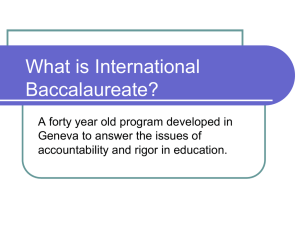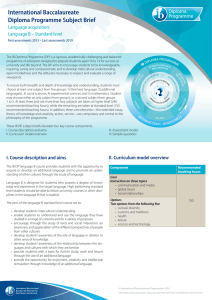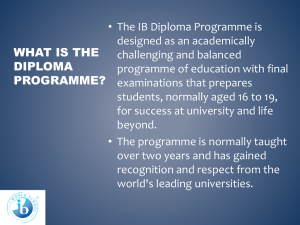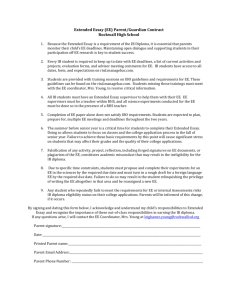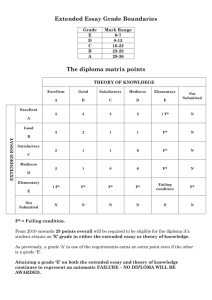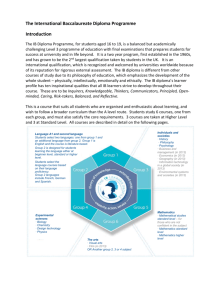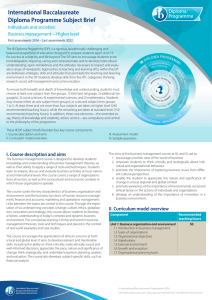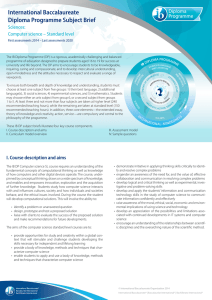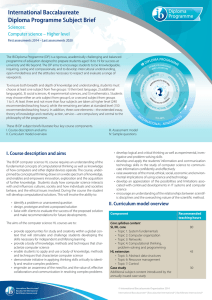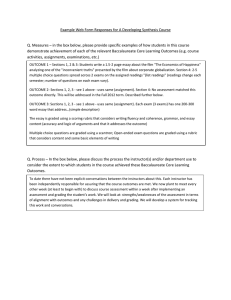Powerpoint Introduction to Metro"s IB Program
advertisement
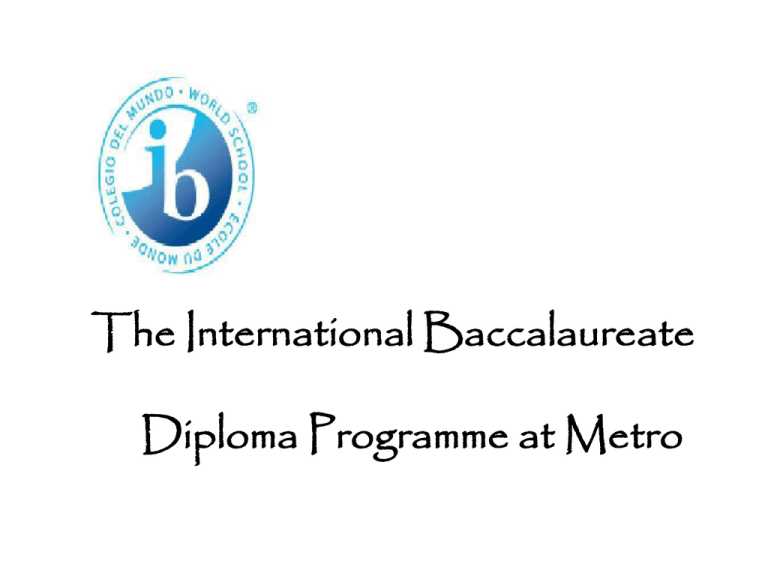
The International Baccalaureate Diploma Programme at Metro Big Picture Regions • Africa / Europe / Middle East • The Americas • Asia Pacific Big Picture Programs • Primary Years Programme (Ages 3-12) • Middle Years Programme (Ages 11-16) • Diploma Programme (Ages 16-19) History • International Baccalaureate founded in Geneva, Switzerland in 1968 • Curriculum and assessment standards to be recognized by universities throughout Europe and the rest of the world. • Facilitate mobility of students Structure Schools “join” the IB • Probationary period • $$$ Staff training • Initial • Ongoing Curriculum • Emphasizes depth • Prescribed topics and readings • Choices by teachers Assessment – Internal • Graded by teachers; reviewed by external examiners • Includes essays, projects, oral presentations and commentary – Final examinations • $$$ • 3-6 hours • Graded by external examiners Mission of IB Help young people to… • Explore knowledge and ideas, • Care enough to help create a better and more peaceful world, • Understand that other people, with their differences, can also be right IB students strive to be… Inquirers who develop their natural curiosity Knowledgeable about ideas and issues that have local and global significance Thinkers who take the initiative to solve complicated problems Communicators who express ideas creatively and confidently and work well with others Principled and act with integrity and a strong sense of fairness and justice Open-minded enough to understand our own personal history , values and traditions and to always seek to understand those of others Compassionate and respectful to the needs and feelings of others Confident risk-takers with the independence of spirit to explore new roles, ideas and ways of doing things and with the courage to defend their beliefs Intellectually, physically and emotionally balanced to achieve personal well-being Reflective about what and how they are learning and to work with their strengths and weaknesses to support their own personal development The rewards… Personal: – Skills – knowledge External: – Priority in college admission – Advanced placement – up to one full year! International Baccalaureate (IB) Advanced Placement (AP) International-emphasis on global perspectives Mostly US- more academic than philosophical From the International Baccalaureate Organization (IBO) Mission: The College Board Mission: Through challenging programs of international education and assessment, IBO seeks to develop inquiring, knowledgeable, and caring young people, who will become compassionate citizens seeking a better and more peaceful world. To be a great educational organization dedicated to preparing, inspiring, and connecting students to college success and opportunity, with a commitment to excellence and equity. Holistic or Total Program- The IB Program is a course of study, encompassing six areas: English, history, science, foreign language, math and an IB-approved elective. Single Strength or Cafeteria Style in which students choose AP courses that fit their strengths and that are independent of one another. Diploma students; Theory of Knowledge Extended Essay Complete 150 CAS (Creativity, Action, and Service) hrs. No additional requirements More divergent- asks why more than what More Convergent- asks what more than why Graded World-wide Graded in US Many factors, such as papers, orals, and projects, in addition to the written exam, determine the final score (1-7) Score (1-5) hinges on the written exam Emphasizes process and integration of content across content areas Content driven IB students may also sit for AP exams AP students may not sit for IB exams From the College Board website: How do colleges and universities recognize International Baccalaureate courses and the IB Diploma? The IB Diploma is increasingly being viewed as a strong indicator of academic promise and achievement. IB students often have an advantage in the admissions process at selective universities. In addition, IB courses and exams are recognized for the purpose of advanced credit and/or placement at over 1,000 North American colleges and universities. In fact, nearly 120 postsecondary institutions now grant a full year of credit or its equivalent to students who have earned the IB Diploma. The Diploma Programme Must have one of each! How the two years look… 11 12 1 IB World Lit (HL) IB English (HL) 2 IB History of Americas (HL) IB History of Americas (HL) 3 IB Biology (SL or HL) IB Biology (SL or HL) 4 IB Math (SL) AP Calculus Trig/AnalyGeo IB Math (SL) AP Calculus Trig/AnalyGeo 5 French 5 / 6 Spanish 5 / 6 AP Latin 5 / 6 IB French (SL) IB Spanish (SL) IB Latin (SL) Elective Choice 5 IB French (SL) IB Spanish (SL) IB Latin (SL) 6 Theory of Knowledge 1 / 2 (HL) Elective Choice 7 IB Music (SL or HL) IB Music (SL or HL) 7 IB Art (SL) Elective Choice Different kinds of assessments… English: major essay and oral commentary Math: project History: major essay Biology: Investigations Languages: orals Art: investigation notebook and “work” Music: performance CreativityActionService Experiential learning Real tasks that have real consequences Spend time with others to build relationships and develop self-worth of both server and served. Creativity – could involve doing dance, theatre, music and art Action – could include participation in expeditions, sports, or physical activities like digging a trench to bring water to a village Service – building links with individuals or groups within the community Extended Essay • Independent research/investigation of topic chosen by the student • Result of approximately 40 hours of work by student • Work is supervised and supported by faculty • Draft due in August of senior year What is TOK? Theory of Knowledge – What do I know and how did I come to know it? – What counts as knowledge in this society? …in other societies? – How does what I’m learning in school fit together?...fit with what I experience outside school? – Who owns knowledge? What is it value ? What are the implications of having, or not having, knowledge? Application Process • Teacher Recommendations • Two required • One must be from English teacher • Review of grades, PLAN scores, attendance • No Fs • Evidence of good habits and motivation • Interview with you and your parents • You’ll need their support!


